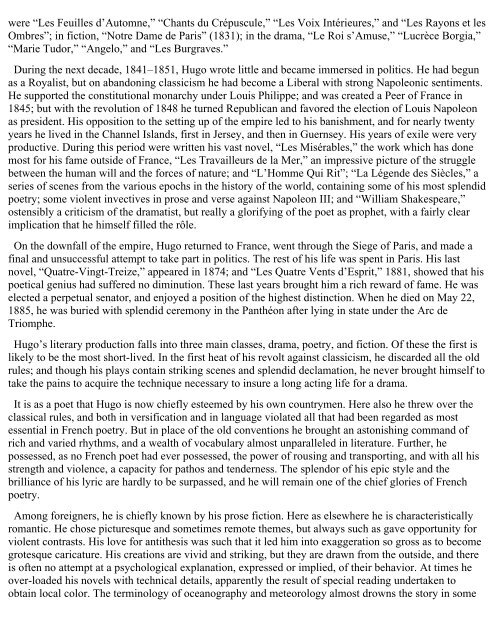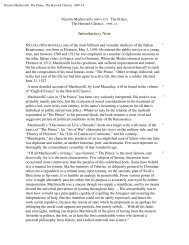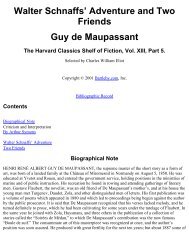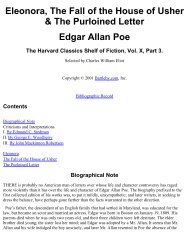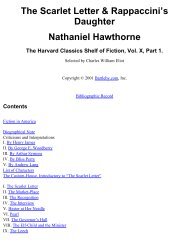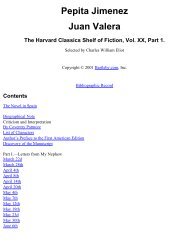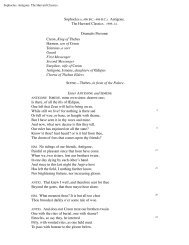Notre Dame de Paris - Bartleby.com
Notre Dame de Paris - Bartleby.com
Notre Dame de Paris - Bartleby.com
Create successful ePaper yourself
Turn your PDF publications into a flip-book with our unique Google optimized e-Paper software.
were “Les Feuilles d’Automne,” “Chants du Crépuscule,” “Les Voix Intérieures,” and “Les Rayons et les<br />
Ombres”; in fiction, “<strong>Notre</strong> <strong>Dame</strong> <strong>de</strong> <strong>Paris</strong>” (1831); in the drama, “Le Roi s’Amuse,” “Lucrèce Borgia,”<br />
“Marie Tudor,” “Angelo,” and “Les Burgraves.”<br />
During the next <strong>de</strong>ca<strong>de</strong>, 1841–1851, Hugo wrote little and became immersed in politics. He had begun<br />
as a Royalist, but on abandoning classicism he had be<strong>com</strong>e a Liberal with strong Napoleonic sentiments.<br />
He supported the constitutional monarchy un<strong>de</strong>r Louis Philippe; and was created a Peer of France in<br />
1845; but with the revolution of 1848 he turned Republican and favored the election of Louis Napoleon<br />
as presi<strong>de</strong>nt. His opposition to the setting up of the empire led to his banishment, and for nearly twenty<br />
years he lived in the Channel Islands, first in Jersey, and then in Guernsey. His years of exile were very<br />
productive. During this period were written his vast novel, “Les Misérables,” the work which has done<br />
most for his fame outsi<strong>de</strong> of France, “Les Travailleurs <strong>de</strong> la Mer,” an impressive picture of the struggle<br />
between the human will and the forces of nature; and “L’Homme Qui Rit”; “La Légen<strong>de</strong> <strong>de</strong>s Siècles,” a<br />
series of scenes from the various epochs in the history of the world, containing some of his most splendid<br />
poetry; some violent invectives in prose and verse against Napoleon III; and “William Shakespeare,”<br />
ostensibly a criticism of the dramatist, but really a glorifying of the poet as prophet, with a fairly clear<br />
implication that he himself filled the rôle.<br />
On the downfall of the empire, Hugo returned to France, went through the Siege of <strong>Paris</strong>, and ma<strong>de</strong> a<br />
final and unsuccessful attempt to take part in politics. The rest of his life was spent in <strong>Paris</strong>. His last<br />
novel, “Quatre-Vingt-Treize,” appeared in 1874; and “Les Quatre Vents d’Esprit,” 1881, showed that his<br />
poetical genius had suffered no diminution. These last years brought him a rich reward of fame. He was<br />
elected a perpetual senator, and enjoyed a position of the highest distinction. When he died on May 22,<br />
1885, he was buried with splendid ceremony in the Panthéon after lying in state un<strong>de</strong>r the Arc <strong>de</strong><br />
Triomphe.<br />
Hugo’s literary production falls into three main classes, drama, poetry, and fiction. Of these the first is<br />
likely to be the most short-lived. In the first heat of his revolt against classicism, he discar<strong>de</strong>d all the old<br />
rules; and though his plays contain striking scenes and splendid <strong>de</strong>clamation, he never brought himself to<br />
take the pains to acquire the technique necessary to insure a long acting life for a drama.<br />
It is as a poet that Hugo is now chiefly esteemed by his own countrymen. Here also he threw over the<br />
classical rules, and both in versification and in language violated all that had been regar<strong>de</strong>d as most<br />
essential in French poetry. But in place of the old conventions he brought an astonishing <strong>com</strong>mand of<br />
rich and varied rhythms, and a wealth of vocabulary almost unparalleled in literature. Further, he<br />
possessed, as no French poet had ever possessed, the power of rousing and transporting, and with all his<br />
strength and violence, a capacity for pathos and ten<strong>de</strong>rness. The splendor of his epic style and the<br />
brilliance of his lyric are hardly to be surpassed, and he will remain one of the chief glories of French<br />
poetry.<br />
Among foreigners, he is chiefly known by his prose fiction. Here as elsewhere he is characteristically<br />
romantic. He chose picturesque and sometimes remote themes, but always such as gave opportunity for<br />
violent contrasts. His love for antithesis was such that it led him into exaggeration so gross as to be<strong>com</strong>e<br />
grotesque caricature. His creations are vivid and striking, but they are drawn from the outsi<strong>de</strong>, and there<br />
is often no attempt at a psychological explanation, expressed or implied, of their behavior. At times he<br />
over-loa<strong>de</strong>d his novels with technical <strong>de</strong>tails, apparently the result of special reading un<strong>de</strong>rtaken to<br />
obtain local color. The terminology of oceanography and meteorology almost drowns the story in some


